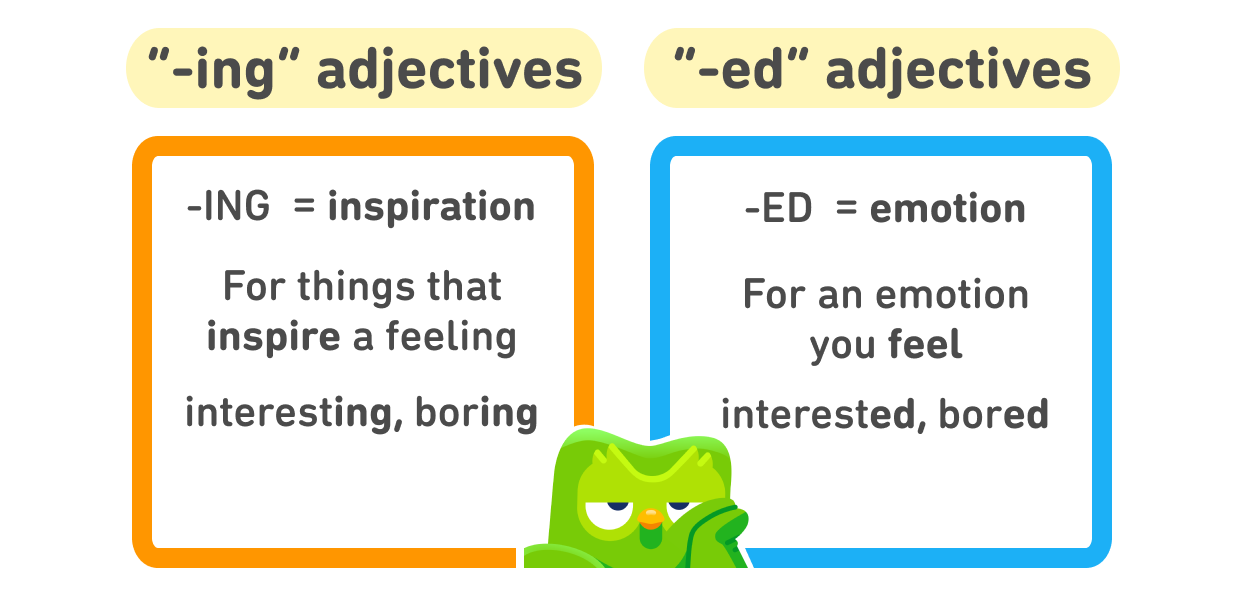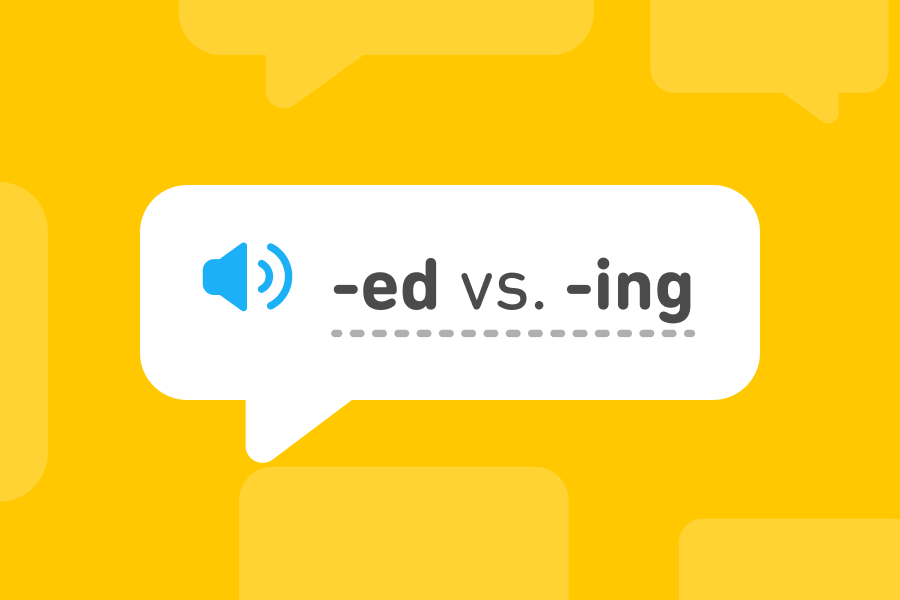Boring? Bored? Interesting? Interested? These English adjectives sound similar, but they are not the same! In fact, changing which adjective you use can dramatically impact the meaning of a sentence.
To decide which adjective is correct, there's a simple trick that English learners of any level can use: The -ing adjectives are about inspiration (I = ING), and the -ed adjectives are for effect and emotion (E = ED).

In this post:
- Using -ing adjectives for inspiration
- Using -ed adjectives for emotion
- Common adjectives with -ing and -ed forms
- Examples of adjectives with -ing and -ed forms
Use -ING adjectives for INSPIRATION
Use -ing adjectives to describe people, places, and things that inspire a feeling. For example, you might see a boring movie or talk to your interesting friend. You could have an exciting day or hear a song that’s annoying.
Use -ED adjectives for EMOTION
If you’re describing the emotion you feel about something, use -ed adjectives. Words like excited, annoyed, and frustrated are all feelings!
Common adjectives with -ing and -ed forms
Many English adjectives have related forms, one with -ing and another with -ed:
| INSPIRATION | EFFECT / EMOTION |
|---|---|
| annoying | annoyed |
| boring | bored |
| confusing | confused |
| disappointing | disappointed |
| disgusting | disgusted |
| exciting | excited |
| exhausting | <exhausted |
| frustrating | frustrated |
| interesting | interested |
| irritating | irritated |
| overwhelming | overwhelmed |
| relaxing | relaxed |
| surprising | surprised |
| tiring | tired |
Examples of adjectives with -ing and -ed forms
A helpful way to understand the difference between these adjectives is to look at sentences that include both forms:
| INSPIRATION | EFFECT / EMOTION |
|---|---|
| The movie is boring, | so you feel bored. |
| Zari’s story is interesting, | so Oscar is interested in it. |
| This is an exciting soccer game, | so Eddy is very excited. |
| What a frustrating project! | I’m so frustrated about it. |
| Today was very tiring, | so we are super tired! |
| Running a marathon is exhausting, | so the athletes are exhausted at the end! |
Swapping -ed and -ing adjectives can be confusing for the listener—and it can sometimes be funny or even embarrassing!
Consider the difference between these pairs of sentences:
| Eddy is at a meeting, and he’s so BORED! |
Eddy is at a meeting, and he’s so BORING! |
| Effect / emotion | Inspiration |
| Eddy feels like the meeting is not very fun, and he wants to fall asleep. | The other people at the meeting think that Eddy is not very fun. They want to fall asleep when Eddy talks! |
| Lin’s cat is very loud in the middle of the night. The cat is so ANNOYING! |
Lin’s cat is very loud in the middle of the night. The cat is so ANNOYED! |
| Inspiration | Effect / emotion |
| The cat causes Lin to feel upset, and it disrupts Lin’s sleep. | Something else is making the cat upset—like maybe he’s hungry. |
| Bea is visiting a haunted house, and she is so FRIGHTENED! |
Bea is visiting a haunted house, and she is so FRIGHTENING! |
| Effect / emotion | Inspiration |
| Bea feels nervous and scared. | Bea is scaring other people. She’s the cause of their fear! |
| I want to leave Oscar’s class because I’m not very INTERESTED. |
I want to leave Oscar’s class because I’m not very INTERESTING. |
| Effect / emotion | Inspiration |
| I don’t care about the topic of Oscar’s class, so I’m leaving. | Other people don’t care about the things I say, so I’m leaving. |
Be excited about learning more English!
Use this inspiration vs. effect memory trick to help you learn the differences between English adjectives. With practice and patience, you’ll be using them confidently in no time!



